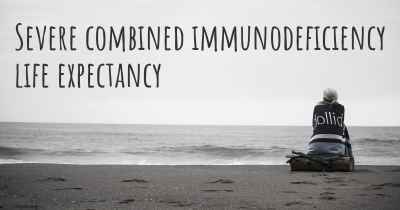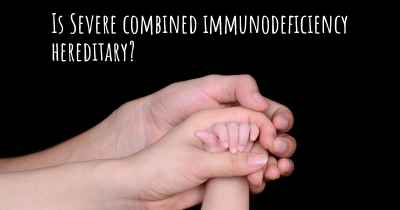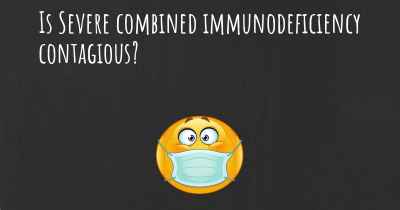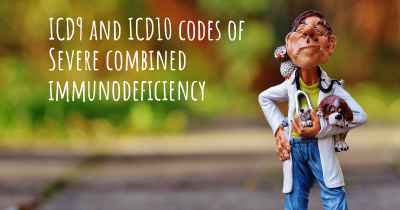How is Severe combined immunodeficiency diagnosed?
See how Severe combined immunodeficiency is diagnosed. Which specialists are essential to meet, what tests are needed and other useful information for the diagnosis of Severe combined immunodeficiency

Diagnosis of Severe Combined Immunodeficiency (SCID)
Severe Combined Immunodeficiency (SCID) is a rare genetic disorder characterized by a severe impairment of the immune system. It is often diagnosed in infants who are highly susceptible to severe and recurrent infections.
Diagnosing SCID involves a combination of clinical evaluation, laboratory tests, and genetic analysis. The process aims to identify the underlying cause of the immune deficiency and confirm the presence of SCID.
Clinical Evaluation
The first step in diagnosing SCID involves a thorough clinical evaluation by a healthcare professional. The doctor will review the patient's medical history, including any family history of immunodeficiency disorders, and perform a physical examination.
During the physical examination, the doctor will look for signs and symptoms that may indicate SCID, such as:
- Frequent and severe infections: SCID patients often experience recurrent and severe bacterial, viral, and fungal infections. These infections can affect various organs and systems in the body.
- Growth and development issues: Infants with SCID may have poor growth, failure to thrive, and delayed development.
- Chronic diarrhea: Persistent diarrhea can be a symptom of SCID, as the immune system plays a crucial role in maintaining gut health.
- Opportunistic infections: SCID patients are susceptible to opportunistic infections, which are caused by organisms that typically do not cause disease in individuals with a healthy immune system.
- Family history: SCID is often inherited, so a family history of immunodeficiency disorders can raise suspicion of the condition.
Laboratory Tests
After the initial clinical evaluation, several laboratory tests are conducted to assess the immune system's function and identify any abnormalities. These tests may include:
- Complete blood count (CBC): A CBC measures the number and types of blood cells. SCID patients often have low levels of lymphocytes, a type of white blood cell essential for immune function.
- T-cell receptor excision circle (TREC) assay: TREC testing measures the presence of T-cell receptor excision circles, which are small DNA circles produced during T-cell development. Low levels of TRECs indicate impaired T-cell production, a hallmark of SCID.
- Immunoglobulin levels: Immunoglobulins are antibodies produced by B-cells. SCID patients may have low levels of immunoglobulins, making them more susceptible to infections.
- Lymphocyte subset analysis: This test measures the different types of lymphocytes, including T-cells, B-cells, and natural killer (NK) cells. SCID patients typically have low or absent T-cell counts.
- Flow cytometry: Flow cytometry is a technique used to analyze and quantify different types of cells in a blood sample. It can help identify abnormalities in the immune cell populations.
Genetic Analysis
Genetic analysis plays a crucial role in diagnosing SCID and determining the specific genetic mutation responsible for the condition. This analysis helps confirm the diagnosis and provides valuable information for genetic counseling and potential treatment options.
Next-generation sequencing (NGS) is commonly used to analyze the patient's DNA and identify genetic mutations associated with SCID. NGS allows for the simultaneous analysis of multiple genes, providing a comprehensive view of potential genetic abnormalities.
Genetic testing may involve:
- Targeted gene panel: This approach focuses on specific genes known to be associated with SCID. It allows for a more targeted analysis and can be particularly useful when a specific genetic mutation is suspected.
- Whole exome sequencing (WES): WES involves sequencing the protein-coding regions of all genes in the genome. It provides a broader analysis and can identify novel genetic mutations.
- Whole genome sequencing (WGS): WGS analyzes the entire genome, including both coding and non-coding regions. It offers the most comprehensive analysis but is more time-consuming and expensive.
Genetic analysis can help identify specific gene mutations associated with SCID, such as mutations in the IL2RG, ADA, JAK3, or RAG1/RAG2 genes, among others. Identifying the genetic cause of SCID is crucial for accurate diagnosis, prognosis, and potential targeted therapies.
Conclusion
Diagnosing Severe Combined Immunodeficiency (SCID) involves a combination of clinical evaluation, laboratory tests, and genetic analysis. The clinical evaluation helps identify symptoms and signs that may indicate SCID, while laboratory tests assess the immune system's function and detect any abnormalities. Genetic analysis, particularly next-generation sequencing, plays a crucial role in confirming the diagnosis and identifying specific genetic mutations associated with SCID. Early and accurate diagnosis of SCID is essential for appropriate management, genetic counseling, and potential treatment options.








